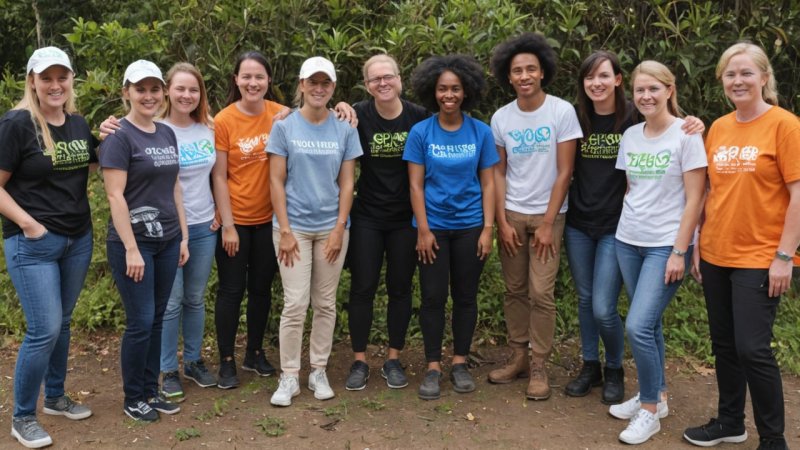In a world increasingly driven by social responsibility and cultural exchange, volunteer travel has emerged as a powerful avenue for individuals to make a positive impact while exploring new cultures and environments. As this sector continues to evolve, innovative approaches and fresh insights are shaping the future of how we engage with volunteer opportunities abroad. From technology-driven platforms that connect volunteers with projects, to a heightened focus on sustainability and local partnerships, the landscape of volunteer travel is transforming in ways that promise to enrich both travelers and the communities they serve.
Technology: The Game Changer
Modern technology is revolutionizing the way potential volunteers find opportunities and connect with organizations. Online platforms and mobile applications have made it easier than ever to search for projects that align with personal interests and skills. Websites like Workaway and HelpX not only showcase volunteer opportunities but also facilitate communication between volunteers and hosts, allowing for a more tailored experience. Furthermore, advancements in virtual reality (VR) and augmented reality (AR) are paving the way for immersive pre-trip experiences, enabling travelers to get a feel for the project and community they will be engaging with before they even set foot on the ground.
Sustainability at the Core
Sustainability has become a key consideration in volunteer travel. More organizations are recognizing the importance of eco-friendly practices and the need to minimize their carbon footprint. This shift is being reflected in the types of projects available; initiatives focused on conservation, renewable energy, and sustainable agriculture are becoming increasingly prominent. Volunteers are encouraged to engage in projects that not only address immediate needs but also contribute to long-term environmental and community sustainability. This holistic approach benefits local communities by empowering them to take charge of their resources while educating volunteers about the critical issues facing these areas.
Local Community Engagement
One of the most significant shifts in volunteer travel is the move towards deeper engagement with local communities. Organizations are prioritizing partnerships with local leaders and residents to ensure that projects align with the community's needs and goals. This collaborative approach fosters mutual respect and understanding between volunteers and locals, leading to more meaningful experiences. By integrating local knowledge and cultural practices, volunteers can contribute in ways that are both impactful and sensitive to the community's heritage.
Short-term vs. Long-term Volunteering
Traditionally, volunteer travel has been associated with short-term projects that can sometimes lead to questions about sustainability and effectiveness. However, there is a growing recognition of the importance of long-term commitments. Organizations are beginning to offer opportunities for extended volunteering, which allows for deeper involvement and more significant contributions to projects. This shift not only benefits the communities but also provides volunteers with a richer, more immersive experience. Long-term volunteering cultivates relationships, fosters trust, and ultimately leads to more sustainable outcomes.
Skills-based Volunteering
As the volunteer travel sector matures, there is a noticeable trend towards skills-based volunteering. Travelers are encouraged to leverage their professional skills—whether in education, healthcare, technology, or business—to contribute in meaningful ways. This model not only enhances the impact of volunteer work but also allows volunteers to gain valuable experience and insights into global challenges related to their fields. For instance, a marketing professional might assist a local non-profit with branding and outreach, while a teacher could help develop educational programs for children. This alignment of skills and needs creates a win-win situation for both volunteers and host communities.
Inclusivity and Diversity
The future of volunteer travel also emphasizes inclusivity and diversity. Organizations are increasingly aware of the need to create opportunities that are accessible to individuals from various backgrounds, regardless of their socioeconomic status. Scholarships, sliding-scale fees, and partnerships with community organizations are being implemented to ensure that volunteer travel is not just for the privileged few. This inclusivity enriches the volunteer experience, fostering a broader exchange of ideas and perspectives, which ultimately benefits all parties involved.
The Role of Education and Training
Education and training are crucial components of the evolving volunteer travel landscape. Organizations are investing in training programs for both volunteers and local communities to equip them with the skills necessary for effective collaboration. Workshops, cultural orientation sessions, and language training can significantly enhance the quality of the volunteer experience while promoting cross-cultural understanding. This focus on education ensures that volunteers are well-prepared to engage meaningfully, thereby maximizing their impact.
Conclusion: Embracing the Future
The future of volunteer travel is bright, characterized by innovation, sustainability, and a commitment to genuine community engagement. As travelers increasingly seek out ways to make a positive impact, organizations are adapting to meet these demands, fostering deeper connections between volunteers and communities. By embracing technology, promoting inclusivity, and focusing on long-term, skills-based contributions, the volunteer travel sector is poised to create lasting change. As we move forward, it's essential for all stakeholders—volunteers, organizations, and communities—to collaborate in shaping a future where travel not only enriches individual lives but also leads to a more equitable and sustainable world.






